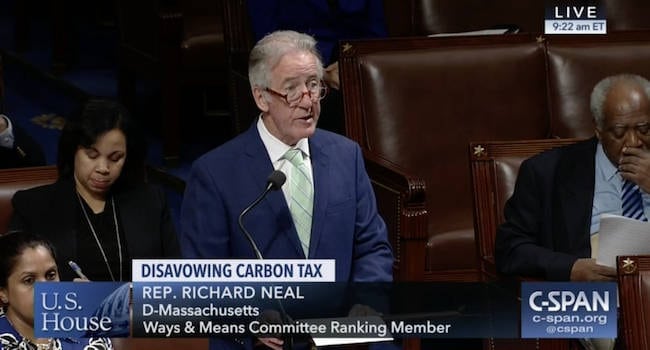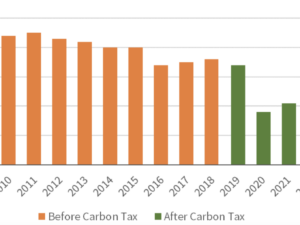
Rep. Neal was one member of the House who spoke in opposition of the resolution, encouraging hearings and more discussion around carbon taxes.
By Flannery Winchester
On July 19th, the House of Representatives passed H. Con. Res. 119, an anti-carbon tax resolution. The non-binding resolution was introduced by Rep. Steve Scalise (R-LA) and claimed, in part, “that a carbon tax would be detrimental to the United States economy.”
This anti-carbon tax resolution has made appearances in Congress before. Rep. Scalise first introduced it in the 113th Congress as H. Con. Res. 24, and a version of it was passed in August 2013 as an amendment to another bill. Rep. Scalise introduced it again in the 114th Congress as H. Con. Res 89, and it passed in June 2016. We are currently in the 115th session of Congress, and with Thursday’s vote, it has passed again.
At first glance, it’s easy to fall into a familiar narrative: the Republican party overall does not acknowledge the present, significant threat of climate change and therefore are opposed to climate action such as a price on carbon. But in fact, the results show a significant shift in the Republican party over the past five years. Just like when reading the League of Conservation Voters’ 2017 scorecard, the context is not only important, but also encouraging.
Fewer sponsors than ever before
In 2013, the resolution had 155 cosponsors. In 2016, it had 82 cosponsors. This year’s push garnered only 48 cosponsors. That’s a precipitous drop, and for good reason.
Over the last two years, the Climate Solutions Caucus has detoxified the issue of climate change in Congress, making it possible to have a respectful, informed conversation about legislative solutions. In that type of atmosphere, it’s much harder to generate enthusiasm for a resolution that lacks nuance and closes off a discussion, rather than continuing one.
Plus, public opinion on carbon pricing and climate solutions is on the rise, and representatives are responding. According to the most recent “Politics and Global Warming” report by the Yale Program on Climate Change Communications, a majority of American voters support requiring fossil fuel companies to pay a carbon tax: 71% of registered voters, 84% of Democrats, 68% of Independents, and 56% of Republicans.
Narrower margin, more Republicans opposed
Rep. Scalise’s resolution came to the floor for a vote in the summer of 2016. It passed with 237 yes votes, 163 no votes, and 2 members who voted present. That’s a margin of 74 votes. No Republicans voted against the resolution.
Today’s vote brought 229 yes votes, 180 no votes, and 2 members voting present. That’s a margin of 49. And this time, six Republicans voted against it. Republican Reps. Carlos Curbelo (FL), Ileana Ros-Lehtinen (FL), Brian Fitzpatrick (PA), Trey Hollingsworth (IN), Mia Love (UT) and Francis Rooney (FL) voted against it.
Seven House Democrats — Kyrsten Sinema (AZ), Sanford Bishop (GA), Henry Cuellar (TX), Vicente Gonzalez (TX), Tom O’Halleran (AZ), Conor Lamb (PA) and Stephanie Murphy (FL) — joined with the rest of Republicans to support the measure.
Reps. Ryan Costello (R-PA) and Michelle Lujan Grisham (D-NM) voted present.
Again, we can likely attribute those no votes in part to the spirit of healthy bipartisan dialogue the Climate Solutions Caucus has introduced into Congress on the issue of climate change. Caucus co-chairs Rep. Carlos Curbelo (R-FL) and Rep. Ted Deutch (D-FL) issued statements in the lead-up to the vote, emphasizing the importance of engagement and debate on all climate solutions. Rep. Curbelo took to Twitter:
Protecting our environment & economic growth aren’t mutually exclusive. This resolution presents a false choice. Agree w/ my Caucus co-founder @RepTedDeutch that #ClimateSolutionsCaucus Members must keep all options on the table to allow for genuine consensus on #ClimateSolutions https://t.co/goDllFdAlR
— Carlos Curbelo (@carloslcurbelo) July 17, 2018
Rep. Deutch issued a statement on his website earlier this week, saying:
“It is the very mission of the caucus to explore all viable options to address the growing threat of climate change. Every Member of Congress, especially caucus members, should keep all options available and not preempt an effective strategy before we even have an opportunity to debate it.”
Their arguments were echoed by some of their Climate Solutions Caucus colleagues on the floor of the House before the vote took place. Rep. John Larson (D-CT) said, “Can you imagine never having a hearing on this? Let me tell you who would like to come to that hearing: Jim Baker, George Shultz, Martin Feldstein, Hank Paulson, Gary Cohn, Rex Tillerson, to name a few, who say that Congress ought to at least be open to looking at a carbon tax.”
Rep. Mike Thompson (D-CA) agreed, saying, “Let’s be real clear: there is not a carbon tax bill before us today. If you have concerns with an issue, have hearings on them.”
Rep. Richard Neal (D-MA), who is not a member of the Climate Solutions Caucus, nonetheless joined in to reinforce the value of robust discussion around climate solutions. “If you want to debate a carbon tax, let’s hold some hearings. Let’s find out what it would mean for the economy. Let’s find out what the impact would be if we have fossil fuel emissions reduced. If you want to have this debate, then let’s have a real debate through hearings.”
Our work is all about meeting representatives where they are on climate, and helping them move forward. This vote shows that Congress, including some Republican members of the House, are ahead of where they used to be. That progress is a foundation for the significant, lasting climate action we need.
Moving forward toward consensus
Interestingly, when Rep. Scalise brought this resolution to the floor back in 2016, his remarks showed a strong desire to protect American jobs, keep America competitive on the international stage, and to protect low and middle income families from price increases. Many of those concerns were repeated on the House floor today before the vote.
Instead of rejecting carbon taxes across the board, Rep. Scalise and his colleagues should take a closer look—all those goals are actually achievable with a well-designed, revenue-neutral carbon tax. An approach like our Carbon Fee and Dividend proposal would in fact add millions of jobs the economy, protect American companies with a border carbon adjustment, and benefit most people by putting more money in their pocket.
As former Republican Congressman Bob Inglis pointed out on Twitter:
Scalise resolution describes a villain of a carbon tax that isn’t being discussed by anyone. If I were still in Congress I might vote “yes.” Why not? Res is useless. Then I’d go on and present the actual c tax the conservatives are for: revenue-neutral, border-adjustable. https://t.co/3LRtLiscdd
— Bob Inglis (@bobinglis) July 18, 2018
This week’s vote presented Congress with a false choice between the environment and the economy. But in fact, the studies have been done and the conclusions are clear: A well-designed price on carbon that returns the revenue to people is a win for the economy, the environment, and our country. This resolution ignored that research, overly simplified the topic, and attempted to shut down conversation.
But that conversation is already robust and continuing to grow. Some Republican members of Congress are already working on bills to price carbon—Rep. Scalise and any of his Republican colleagues are welcome to join the discussion at any time. We invite them to explore the nuances of this topic and discover the huge benefits awaiting our country.
The amount of public support for a well-designed national carbon pricing policy is becoming undeniable. We’re confident this vote will not slow that growing momentum, and we look forward to the day Congress responds with significant bipartisan legislation to price carbon and return the revenue directly to the American people.





